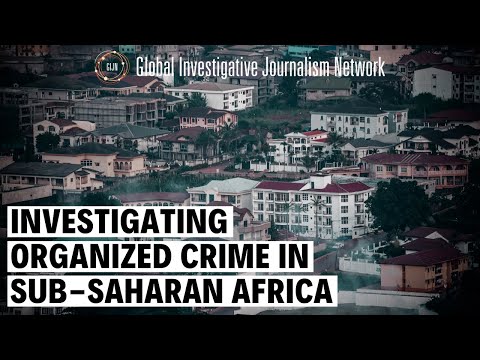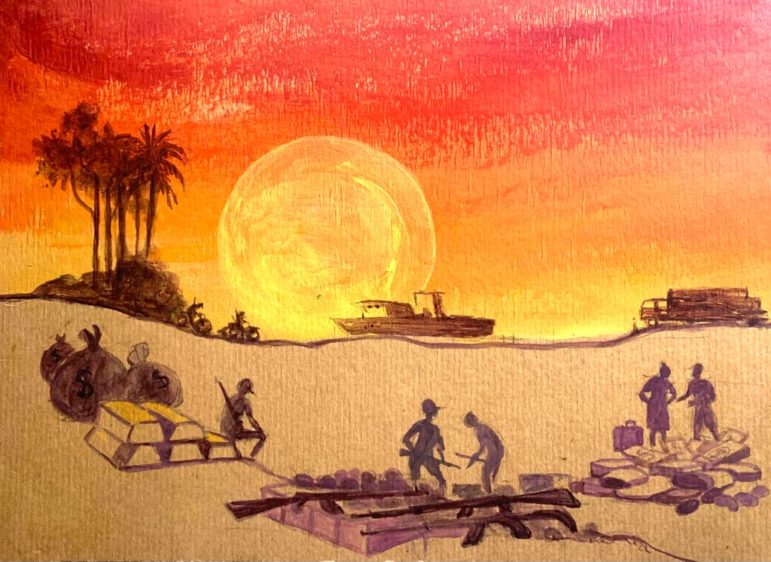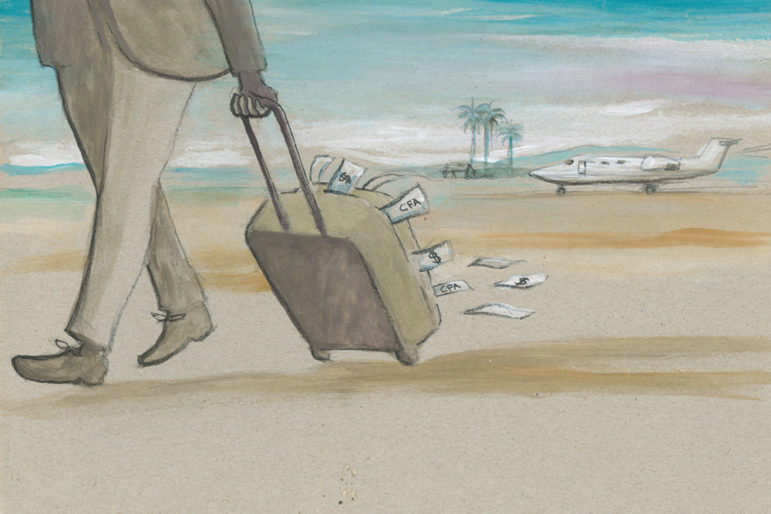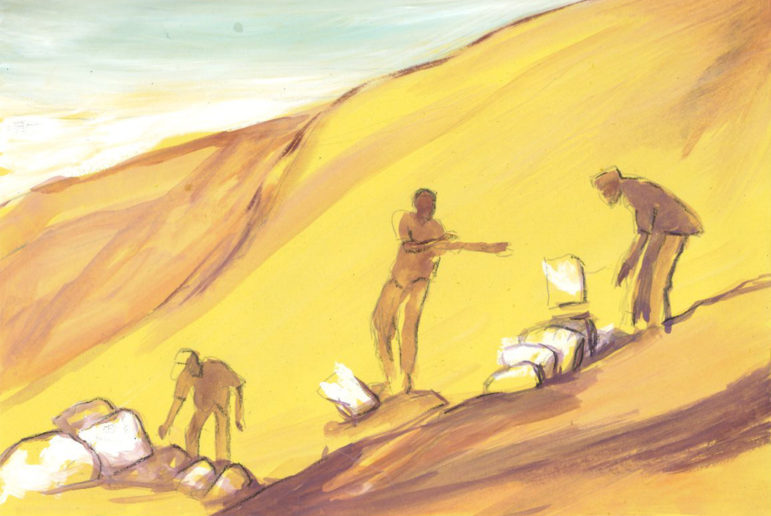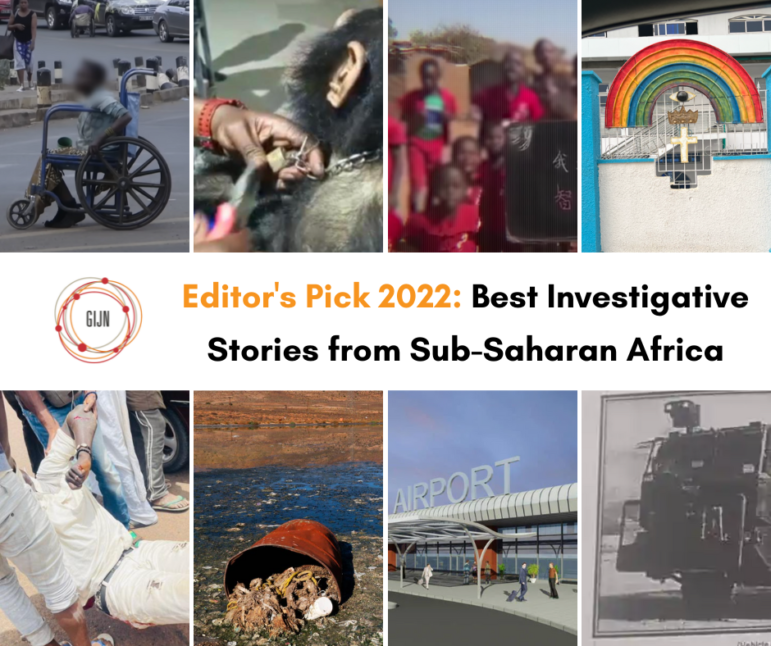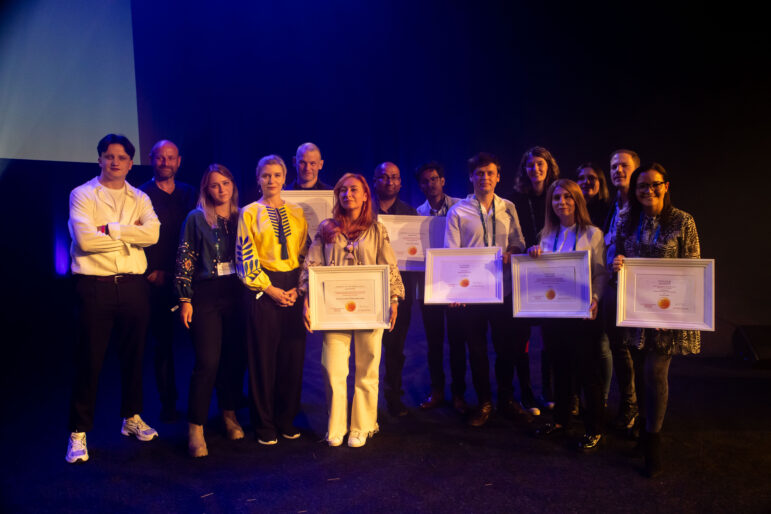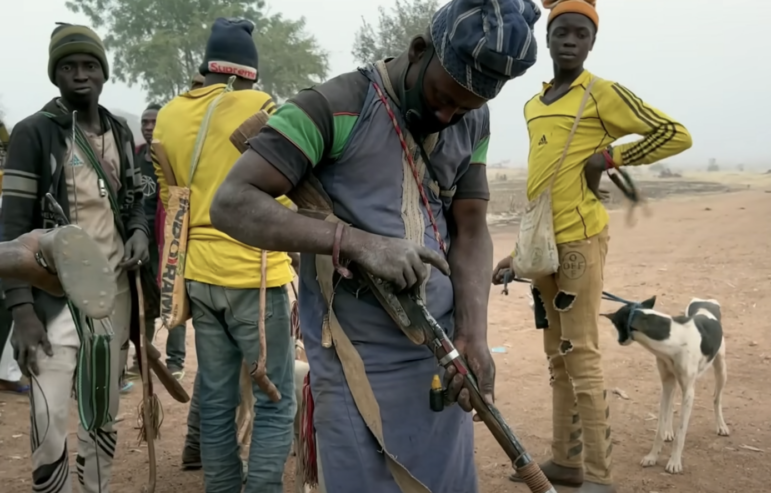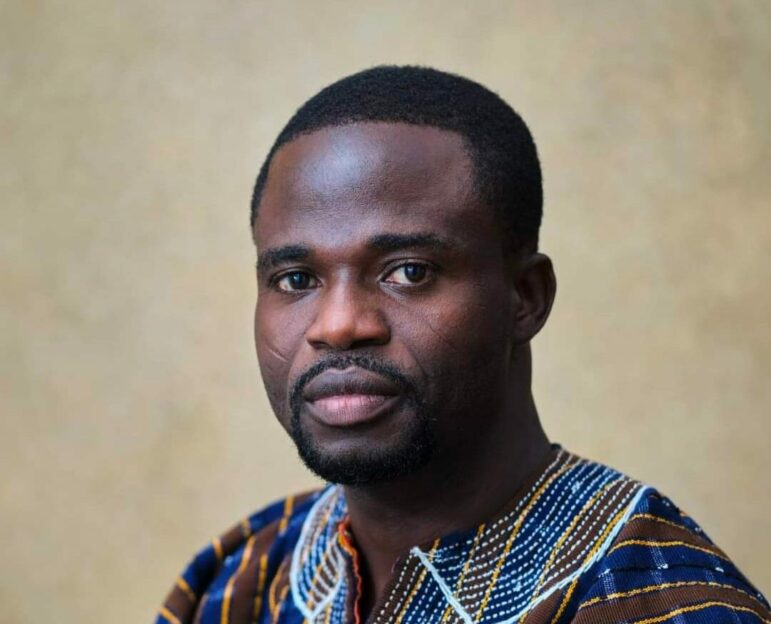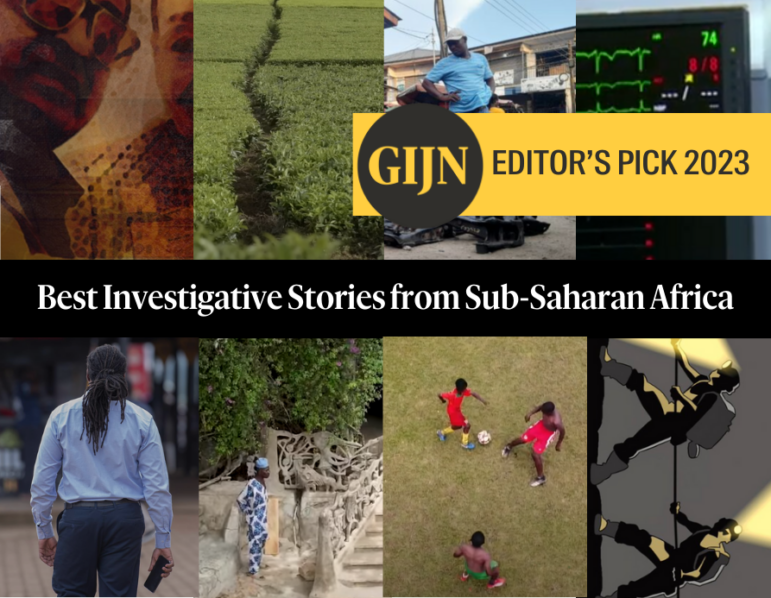

Image: GIJN
Gold Mafias, Hospital Fraud, Youth Footballer Sexual Abuse: 2023’s Best Investigative Stories from Sub-Saharan Africa
Mention any global journalism award of note, and you will likely find stories by African journalists or media organizations receiving recognition. In 2023, investigations from Nigeria and South Africa emerged as winners of GIJN’s Global Shining Light Award, while Burkina Faso’s Mariam Ouedraogo won the ICFJ Knight International Journalism Award and the Bayeux Calvados-Normandy Award for war correspondents. Nigeria’s Philip Obaji Jr. scooped the One World Media’s International Journalist of the Year Award. South Africa’s Dewald van Rensburg won the 2023 TRACE Prize for Investigative Reporting: Uncovering Commercial Bribery.
Journalists and media organizations from Africa have also contributed to some remarkable and impactful collaborative investigations, such as the partnership between The Examination (United States) with The Museba Project (Cameroon) and Ghana Business News, which produced a watchdog story on how the toxic industry of battery recycling — brought to Africa by Indian companies — are making people in nearby neighborhoods sick. Another collaboration between journalists in Africa and Europe, which looked into illegal crude oil mining in Nigeria, emerged as one of the 2023 Hostwriter Story Prize category winners.
These accolades and alliances testify to the remarkable growth in investigative rigor, quality, and multimedia nature of watchdog journalism in Africa, and also symbolize the continually growing stature of African muckraking on the global stage.
Still, some of the best investigative stories from and on Africa have yet to earn global recognition or even get their merited place in the sun within the continent itself. However, GIJN keeps tabs through its monthly curation of the best watchdog stories from across English-speaking sub-Saharan Africa, which are featured in our monthly Africa newsletter. Below is a short list of the stories we consider among the best output from investigative journalists in, or doing stories about, sub-Saharan Africa throughout 2023.
Sex for Work: The True Cost of Our Tea (Kenya)
Kenyan investigative journalist Tom Odula has cut a niche as a passionate, daring storyteller and he invested similar energy into this story, which won the inaugural African Investigative Journalist of the Year Award at the 2023 African Investigative Journalism Conference in late November.
Teaming up with a female undercover reporter and dedicating 18 months to their fact-finding efforts, the pair exposed widespread sexual abuse on the farms that supply tea to some of the biggest brands in Europe. The story revealed that more than 70 women working on the tea farms owned by two British companies said their supervisors had sexually abused them.
The impact of this investigation was immediate — and wide-ranging. One of the UK companies released a statement saying they immediately suspended two employees identified in the story, while the CEO of a second told a media outlet that they, too, had sanctioned their managers at the center for the scandal. Kenya’s Parliament ordered an investigation, while an international body suspended certification of the two major tea companies on whose plantations the alleged abuse happened.
Nearly a year after BBC Africa Eye first broadcast Odula’s investigation, the impact of this bombshell sex abuse exposé is still reverberating.
The Water Manifesto (Nigeria)
This three-part docuseries by The Cable newspaper’s AnuOluwapo Adelakun is an extensive piece of investigative journalism. In it, the reporter used a combination of old-school field reporting methods and various new scientific and forensic investigative techniques to gather comprehensive evidence about polluted water bodies in different parts of Nigeria.
Adelakun and her team went the extra mile to undertake an independent quality test of the water from River Osun, which flows across five Nigerian states on its way to the Gulf of Guinea, to show the extent to which it had been tainted by mining and other extractive activities. And she demonstrated admirable courage in overcoming the personal risks she was exposed to in completing this investigation. Her story also was recognized internationally and won first place (in the small outlets category) in the Society for Environmental Journalists’ 2023 Kevin Carmody Award for Outstanding Investigative Reporting.
Gold Mafia (Zimbabwe/South Africa)
Revelations from journalism investigations do not come any bigger than this four-part series by Al Jazeera’s investigative unit. Operating undercover, the journalists infiltrated rival gangs in Zimbabwe and South Africa that turn dirty money into gold, which is then sold around the world. Al Jazeera’s I-Unit, whose team conducted most of its investigations covertly, also obtained thousands of documents related to money laundering and gold smuggling from Southern Africa.
Among the revelations that the investigations unearthed was an offer by a senior Zimbabwean ambassador to launder US$1.2 million using his diplomatic pouch, a scheme by alleged mafia criminals to clean more than $100 million through government gold exports, and a disclosure that the Reserve Bank of Zimbabwe is southern Africa’s biggest dirty money laundromat.
Authorities in both South Africa and Zimbabwe promised to investigate the findings of the documentary, but journalists in the latter were subsequently threatened with imprisonment if they continued reporting on the story.
The Dark Side of European Used Cars (Ghana)
Owing to the increasingly globalized nature of the world, some stories need the missing dots to be connected from across far-flung borders. Take the example of this investigation from iWatch Africa, which shows the power of collaboration between African and European journalists, offering readers a perspective that would have been out of reach had the reporting been done only within Ghana or even Africa.
With many Africans driving used vehicles from Europe and other parts of the world, this investigation found that 80% of the more than 280,000 vehicles imported to West Africa from the Netherlands no longer met European emissions standards and often lacked basic road-worthiness certifications. It also revealed that Ghana’s two key local regulators, the road safety authority and the standards authority, lack any scientific specifications or pollution standards for auto spare parts exported to the country.
This avalanche of used vehicles and spare parts contributes to air pollution in Africa’s growing cities, the story pointed out. In Accra, for instance, about 40% of the Ghanaian capital’s air pollution concentrations are related to vehicle transport emissions, contributing to an annual air pollution concentration that is 11 times higher than the World Health Organization’s air quality standard (as of 2020).
Sexual Predators on the Pitch (Gabon)
Sexual abuse does not come to light easily in Africa, more so when it involves the exploitation of young men. So, this BBC Africa Eye investigation into “one of the biggest sexual abuse scandals in the history of football” shined the spotlight on an issue that has been kept in the dark for more than 30 years.
In this story, which was the result of a year-long investigation, journalist Khadidiatou Cissé used first-hand accounts and corroborating testimony from eyewitnesses to reveal the harrowing experiences of young male players who were victims of sexual assault due to systemic abuse. Cissé goes the extra mile to question the local football leaders in Gabon who failed to act, as well as challenge continental and global football authorities about their allegedly complicit behavior.
Exposing a Rogue National Health Insurance Fund Heist (Kenya)
In June 2023, Nation Media Group’s Ibrahim Karanja produced an impactful multimedia investigation rich in human sourcing and data-driven reporting. Equally importantly, it sent shockwaves through Kenya’s National Health Insurance Fund (NHIF) and beyond. This investigation, which was also packaged for newspaper and website readers, tracks the victims of a fraudulent scheme in which four hospitals allegedly pocketed hundreds of millions of Kenya shillings in fictitious claims.
After the story ran, Kenya’s Ministry of Health suspended NHIF managers in the two counties where NMG carried out its investigations, and the government agency also suspended contracts with six hospitals identified in the story. But there was also a backlash, as the human rights activists who blew the whistle regarding the fraud suffered death threats, showing just how high the stakes were for this blockbuster story. Later, a man was arrested and charged in court with an attempt to interfere with the witnesses set to testify in judicial proceedings related to the NHIF scandal.
Dreadlocks and Discrimination (Uganda)
Some stories are difficult to tell because there is so little data or documented evidence. However, for this Centre for Collaborative Investigative Journalism (CCIJ) story, Ugandan journalist Arthur Arnold Wadero deftly navigated past such obstacles.
Faced with a dearth of official records to corroborate claims by individuals who wear dreadlocks that they suffer discrimination in the justice system and social exclusion in the hunt for job opportunities, Wadero and the CCIJ team set out to do a survey to generate the primary data he needed for his story.
This data helped Wadero do in-depth reporting on the story and corroborate anecdotal insights he obtained from interviews with individuals who wear dreadlocks, as well as media reports, online sources, and legal documents. His investigation, published by CCIJ’s digital platform, Veza News, is a prime example of how a journalist can turn an off-beat social topic rarely explored in mainstream discourse into an issue that deserves public attention, debate, and scrutiny.
The Dystopian Underworld of Illegal Mining (South Africa)
In this captivating narrative, South African freelance journalist and researcher Kimon de Greef blends a touch of crystal-clear detail and flowery storytelling to paint a detailed picture of illegal underground mining in his home country.
In his inspiring investigation, Kimon uses his repertoire of narrative skills to take us underground, to understand South Africa’s illegal miners (zama zamas), who come from several Southern African countries to work in old abandoned mining sites.
Some of the warnings in Kimon’s article, which was published in The New Yorker, are almost prophetic. For instance, a recent explosion in the Johannesburg central business district, which authorities attributed to methane gas, shows the dangers of increased activities of the zama zamas, whose ranks are swelling considerably across Africa’s second-largest economy.
 Benon Herbert Oluka, GIJN’s Africa editor, is a Ugandan multimedia journalist. Benon is a mentor for the 2023/2024 African Union Media Fellowship cohort. His work has been recognized three times on the African continent as the winner of the 2008 Akintola Fatoyinbo Africa Education Journalism Award (First Prize, English category), the 2011 CNN-MultiChoice African Journalist of the Year Award (Tourism category), and the Thomson Reuters’ 2011 Niall FitzGerald Prize for Young African Journalists.
Benon Herbert Oluka, GIJN’s Africa editor, is a Ugandan multimedia journalist. Benon is a mentor for the 2023/2024 African Union Media Fellowship cohort. His work has been recognized three times on the African continent as the winner of the 2008 Akintola Fatoyinbo Africa Education Journalism Award (First Prize, English category), the 2011 CNN-MultiChoice African Journalist of the Year Award (Tourism category), and the Thomson Reuters’ 2011 Niall FitzGerald Prize for Young African Journalists.

